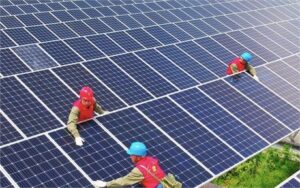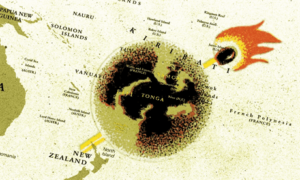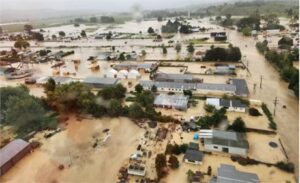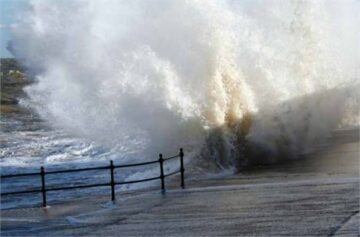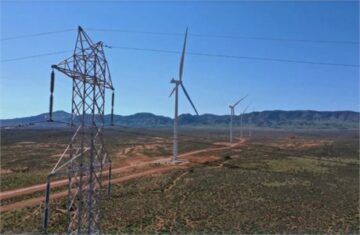Jeremy Rose: Last year when asked about what role New Zealand can realistically play in tackling climate change when we’re only responsible for 0.17% of the world’s emissions, you responded by saying the same could have said about New Zealand’s contribution to the fight against fascism.
And that got me thinking. We joined the war effort in 1939 and we declared a climate emergency in 2019. By 1943 something like 190,000 people had been enlisted, 10,000 or so had died and we were committing about 50% of national income to the war effort.
In 2023 I’m being asked to pay an extra 12 cents or so on every litre of petrol I buy and that’s about it.
Are we acting like we’re in an emergency?
Rod Carr: I don't think we are treating it like an emergency. Because normally an emergency comes with a degree of urgency. And I don't detect that sense of urgency in the political decision making. There’s growing urgency in the business community, partly driven by risk and cost, but also increasingly by a sense of opportunity, and inevitability, and the need to be on the right side of history.
The simple answer is we have declared an emergency but we have yet to see the urgency. I don't think New Zealanders understand the pace and scale of the transition that lies ahead. And the question for us is when we transition - there's no doubt that we will transition - to what extent are we going to be in control of it?
To what extent will it be a well planned and executed transition? Or to what extent will it be a chaotic and disruptive transition? We can still choose a pathway to have a well planned, well executed inclusive transition.
But if we don't make those choices, we will still transition. The world cannot sustain the kind of social and economic infrastructure that relies on 50 to 55 billion tons a year of greenhouse gas emissions. The unsustainable will not be sustained.
It is in New Zealand self-interest to move and promote lower emitting ways of living, and low emitting product and services to consume domestically and sell to the world. That is the opportunity, that is the future. And that if we constantly look back at the past, we will get left behind and left out.
An opportunity for a greener world
You’ve reminded me of book I read as a teenager: H G Well’s The Rights of Man: What Are We Fighting For? It was an inspiring read - even reading it years after the fighting had stopped - because it imagined a much better world. The US and Europe have both announced Green New Deals that capture something of the same spirit. Is New Zealand missing a trick? Are we harvesting the benefits that are there to be harvested?

Not yet. My concern is we still seem to think of this as an obligation imposed on us unfairly and unreasonably by others. We don't see it as an opportunity to create the greener, cleaner, healthier, more sustainable way of living that it is. We have to change the narrative from one of how little have we got to do in order to comply with it into: Look at the size of the opportunity to create, by 2050, a low emitting way of living that is healthier, more affordable, and creates opportunities for New Zealand to serve the world.
We've got to make that change in mental framing if we going to get the mass of people to support elected leaders to make the hard choices over the decades to come. This is not a one and done decision. This is a long transition from a high emitting way of creating income and living our lives to a much lower environmental footprint generally, and much lower emissions particularly. And we have to get on with it.
ETS not the only tool
To what extent is the Emissions Trading Scheme, and the idea that simply putting a cost on carbon will lead to a green nirvana to blame for that? There’s an argument you hear that if it’s in the ETS then you can just leave it to the invisible hand of the market to deal with it?
The ETS and putting a price on emissions is an important tool. It’s never been the only tool that we have to use to get there.
Putting a price on emissions for half of the emissions - because agriculture is not in the ETS, and is not likely to be in the ETS - so for half our emissions requiring polluters to pay and rewarding investment and lower emitting technologies, business practices, and rewarding consumers for choosing lower emitting products and services is definitely a tool worth having in the toolbox and keeping sharp.
But there are impacts on vulnerable and low income households who face higher prices as a result of the change in relative prices.
And the Commission's view is that that needs to be addressed by using tools the government already has, such as the winter energy payments targeted at those low income and vulnerable households, such as the beneficiary payments targeted at low income and vulnerable households.
But we have to let relative prices change to reward lower emitting investments and reward lower emitting business practices. And essentially, that part of the ETS is on the table, it is able to do its job, if it is allowed to do that job.
There is a challenge with the ETS and that is the way that it recognises a tonne of sequestration in the biosphere as being equal to a tonne of release from the geosphere. And while the tonne of carbon released and a tonne of carbon sequestered is the same, the certainty of the sequestration is not as certain as the release from the geosphere. And that risk is what we're putting on future generations to maintain the carbon stores in the biosphere, i.e. our forests to compensate for what you and I released from the geosphere decades before.
That's a pretty big ask on future generations. That's why we need to get gross emissions down. And the ETS is currently structured in a way that is indifferent to whether you get a one time reduction on gross emissions or a one time increase in sequestration. That part of the system and the ETS needs to be reviewed.
Recycling ETS proceeds worth investigating
Are you saying that you would support the recycling of the ETS revenues to individuals rather than to companies like is presently happening with the government’s GIDI funding?
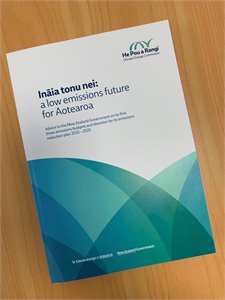
In Ināia tonu nei the Commission did express the view that the idea of using some of the auction proceeds as a carbon dividend should be investigated. We had not done the work to determine whether or not that was a good idea, and, if it was a good idea, how it should be implemented.
You could either have a universal payment to every household, or you could have larger but targeted payments to the most vulnerable households. So, there's a lot of options within the general construct of recycling revenue.
What is the role of individuals in a climate emergency?
Young people often ask me: What can we do? Because they feel unempowered. They're not directors of companies, they don't have control over large capital investment decisions. They don't make regulations. So young people in particular say: What can I do? And in replying to them, I've over time said: Look, there are a number of things that we can all do.
The first and most obvious one is become informed about these issues, don't go down the rabbit holes in social media, you're well educated take the time to think critically about what you're hearing. And all the evidence is very clear, the evidence that human activity is causing greenhouse gases to rise at unprecedented rates, that the consequence of that is to make more chaotic weather events, which impact on us, that our efforts to date have been unsuccessful at causing a reduction and scale and pace that is needed. That stuff is publicly available, knowable, and we have an obligation to know it.
Secondly, once you have information, don't hold it to yourself, share it with your peers, and your family and your networks. That doesn't mean you have to become a climate activist. It just means in the discourse of the day, add to the understanding of people you have relationships with.
Thirdly, young people have talent that the labour market is seeking. So make sure that you choose an employer, and once employed, you use your knowledge to help that business put itself on a pathway first to understand its emissions, and the risks high emitting activities face, and how to get that business to reduce its emissions. Because as an employee, you actually have quite a lot of leverage from within the organisation. So who you choose to work for, and how you contribute to their strategic agenda is actually quite an important lever that you have.
And I would also say that when you buy something; mindful purchasing is really important. Because the system is designed to put back on the shelf, the thing you bought. So every dollar is a vote. And if you vote for high emitting activities, then more high emitting activities will exist for longer. If you choose not to buy them, then they are unlikely to be offered up again.
As consumers in a consumer society, every day, we buy something we vote for that thing to be made. So again, I think we're actually more empowered as individuals than we might feel. And those are the major ways that I believe every one of us can play a part how stuff, share your stuff, think about the leverage from where you work, and who you work for. And be mindful about what you buy.
Markets are myopic, reckless and selfish
How do you respond to the market purists who say: If it’s in the ETS it makes no difference?
So the first thing is what I call the limits to markets. I love markets. I've studied markets, I spent 40 years making a living in and around markets - mainly financial markets, and credit markets and stuff like that.
I understand and respect the power of markets and the devolution that gives to individuals to make choices.
It is an incredible human invention, the marketplace and exchange. But in my experience, markets have three very important limits. They're myopic, they're reckless, and they're selfish.
Let me say what I mean by each of those. Markets are inherently myopic, that is short sighted. Markets discount the future heavily, because they are often constrained by cash, not value.
So ideally, they wouldn't be debt constrained. But the reality is that value is monetized and that requires cash. And if you run out of cash, you are cash constrained and markets are not the perfect and complete way of discounting the future.
So from that point of view, I would say they are myopic. They discount the future too heavily because they are cash constrained. The purist has to explain why they think that cash doesn't matter.
Secondly, I say that they are reckless in the sense that we privatise benefits and socialise costs, that we take all the upside for ourselves and leave the costs and losses to be socialised.
This isn't a criticism of markets, it is just a description of markets. That's why we have limited liability companies. It's why children don't inherit their parents debts. We take the losses off the table when things go wrong. So markets do take more risk, than you and I would take if our children inherited our debts, and there was no such thing as limited liability. That's why we created limited liability, in order to limit risk.
Finally, markets are selfish. There are externalities to every market. Markets are designed in a way to build on your and my interest in optimising our own self interest. Adam Smith wrote the book on enlightened self interest. But you have to read his Theory of Moral Sentiments to understand what he assumed.
He assumed humans are innately empathetic with the circumstances of other human beings. And that therefore, given that assumption, enlightened self interest would make us all individually and collectively better off. What we now live is in a mutated form of that where enlightened self interest has degraded to simple selfishness. And that we saw at the peak in the 1980s, which was essentially greed is good. We have come to understand that the externalities of that are unsustainable socially, culturally, environmentally, as well as economically in terms of a social licence for business.
Interview edited for length and sense.
.................................
In part two of the of the interview, to be published on Wednesday, Rod Carr tells us what happens to the thousands of submissions made to the commission by ordinary citizens; that New Zealand pastoral farmers cause more emissions than non-pastoral farmers in other countries, and that 30% of New Zealand homes would be economically better off with solar panels on their roofs.
- SEO Powered Content & PR Distribution. Get Amplified Today.
- Platoblockchain. Web3 Metaverse Intelligence. Knowledge Amplified. Access Here.
- Minting the Future w Adryenn Ashley. Access Here.
- Source: https://www.carbonnews.co.nz/story.asp?storyID=27544
- :has
- :is
- :not
- :where
- $UP
- 000
- 1
- 10
- 2019
- 2023
- 50
- a
- Able
- About
- about IT
- Activist
- activities
- activity
- actually
- Adam
- Adam Smith
- affordable
- After
- against
- agenda
- agriculture
- ahead
- All
- already
- also
- an
- and
- announced
- answer
- ARE
- argument
- around
- AS
- assumed
- assumption
- At
- Auction
- available
- back
- BE
- because
- become
- been
- before
- behind
- being
- believe
- beneficiary
- benefits
- Better
- Big
- Billion
- book
- both
- bought
- build
- business
- business practices
- but
- buy
- by
- call
- CAN
- cannot
- capital
- capture
- carbon
- Cash
- Cause
- causing
- certain
- certainty
- challenge
- change
- Children
- choices
- Choose
- choosing
- circumstances
- Citizens
- clear
- Climate
- Climate change
- CO
- collectively
- come
- commission
- committing
- community
- Companies
- complete
- Concern
- constantly
- construct
- consume
- consumer
- Consumers
- contribute
- contribution
- control
- Cost
- Costs
- could
- countries
- create
- created
- creates
- Creating
- credit
- criticism
- Currently
- Date
- day
- deal
- Deals
- Debt
- decades
- decision
- Decision Making
- decisions
- definitely
- Degree
- description
- designed
- Determine
- DID
- died
- difference
- Directors
- Discount
- disruptive
- dividend
- do
- Dollar
- domestically
- don
- doubt
- down
- driven
- e
- each
- Economic
- effort
- efforts
- either
- elected
- emergency
- Emissions
- Employee
- empowered
- energy
- environmental
- environmentally
- essentially
- Europe
- Even
- events
- Every
- every day
- evidence
- exchange
- experience
- Explain
- express
- extra
- Face
- family
- farmers
- fight
- fighting
- financial
- First
- Footprint
- For
- form
- from
- funding
- future
- GAS
- General
- generally
- generations
- get
- given
- gives
- Go
- going
- good
- Government
- Greed
- Green
- greenhouse gas
- Greenhouse gas emissions
- gross
- Growing
- Half
- hand
- Happening
- happens
- Hard
- Harvesting
- Have
- having
- he
- healthier
- hear
- hearing
- heavily
- help
- High
- higher
- history
- hold
- Holes
- Homes
- household
- households
- How
- How To
- HTTPS
- human
- Humans
- i
- idea
- Impact
- Impacts
- implemented
- important
- imposed
- in
- In other
- Inclusive
- Income
- Increase
- increasingly
- incredible
- Individually
- individuals
- information
- informed
- Infrastructure
- inspiring
- interest
- Interview
- into
- Invention
- investment
- Investments
- issues
- IT
- ITS
- itself
- Job
- joined
- jpg
- just
- keeping
- Kind
- Know
- knowledge
- Labour
- large
- larger
- lead
- leaders
- Leave
- Length
- Leverage
- liability
- Licence
- lies
- like
- likely
- LIMIT
- Limited
- limits
- little
- live
- Lives
- living
- Long
- longer
- Look
- losses
- Lot
- love
- Low
- made
- maintain
- major
- make
- MAKES
- Making
- man
- Market
- marketplace
- Markets
- Mass
- Matter
- means
- Media
- mental
- might
- missing
- more
- most
- move
- NARRATIVE
- National
- Need
- needed
- needs
- networks
- New
- new deals
- New Zealand
- normally
- now
- number
- obvious
- of
- offered
- on
- ONE
- only
- opportunities
- Opportunity
- Options
- or
- order
- ordinary
- organisation
- Other
- Others
- our
- over
- own
- Pace
- panels
- parents
- part
- particular
- particularly
- past
- Pay
- payment
- payments
- Peak
- People
- perfect
- planned
- plato
- Plato Data Intelligence
- PlatoData
- Play
- Point
- Point of View
- political
- power
- practices
- pretty
- price
- Prices
- proceeds
- Product
- Products
- Products and Services
- promote
- publicly
- published
- purchasing
- put
- Putting
- question
- Rabbit
- Rates
- rather
- RE
- Read
- Reading
- Reality
- really
- reckless
- recycling
- reduce
- regulations
- Relationships
- release
- released
- requires
- respect
- Respond
- responsible
- result
- revenue
- revenues
- reviewed
- Reward
- rewarding
- rights
- Rise
- Risk
- risks
- Role
- ROSE
- Run
- s
- Said
- same
- Scale
- scheme
- seeking
- SELF
- self interest
- sell
- sense
- Sense of Urgency
- sequestration
- serve
- Services
- Share
- sharp
- Shelf
- Short
- should
- Simple
- simply
- Size
- So
- Social
- social media
- socially
- Society
- solar
- solar panels
- some
- something
- spent
- spirit
- Still
- stopped
- stores
- Strategic
- structured
- studied
- Submissions
- such
- support
- sustainable
- system
- table
- Take
- Talent
- targeted
- Technologies
- teenager
- tells
- terms
- than
- that
- The
- The Future
- the world
- their
- Them
- There.
- therefore
- These
- they
- thing
- things
- Thinking
- this
- those
- thousands
- three
- time
- to
- tons
- too
- tool
- Toolbox
- tools
- Trading
- transition
- treating
- understand
- understanding
- Universal
- unprecedented
- unsustainable
- Upside
- urgency
- us
- use
- using
- value
- Ve
- View
- Vote
- Vulnerable
- war
- was
- Way..
- ways
- we
- Weather
- Wednesday
- WELL
- were
- What
- whether
- which
- while
- WHO
- why
- will
- Winter
- with
- within
- Work
- world
- world’s
- worth
- would
- Wrong
- year
- years
- you
- young
- Your
- yourself
- Zealand
- zephyrnet

